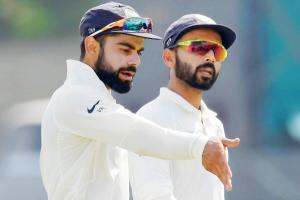From my experience as vice-captain to the wily Bill Lawry from 1968 to 1971, the role involves mostly keeping your ear to the ground and ensuring there is no threat of mutiny in the team

Team India captain Virat Kohli (left) chats with vice-captain Ajinkya Rahane during Day Two of the first Test against Sri Lanka at Galle International Stadium in July last year. Pic/Getty Images
In a radical departure from tradition for a cricket team, Australia has appointed two vice-captains, a move that is in part both succession planning and equal opportunity.
Mitch Marsh, who will fulfil the solo role against Pakistan in the UAE has been appointed with an eye on the future. If Josh Hazlewood is deemed fit for the Test series against India later in the year he'll take his place alongside Marsh in acknowledgement that bowlers are the forgotten men when it comes to leadership roles.
ADVERTISEMENT
Langer's approach
I doubt this unique move will help Australia much but neither will it hinder. Justin Langer's novel approach to the leadership issue stems from discussions with Australian rules football coaches. They have a tendency to venture into creative competitiveness and a few football teams have even appointed co-captains.
However, leadership of a football team bears little relationship to what is required in a cricket team; the former involves minimal on-field decision making, while the latter requires the skipper to oversee all the moves during a match.
From my experience the vice-captaincy role involves mostly keeping an ear to the ground and ensuring there is no threat of mutiny. This off-field task can also extend to offering advice to players you may be closer to than the captain. On the field I discovered early in the role that your advice isn't necessarily acted upon.
In my debut as vice-captain at the SCG in 1968-69, Australia had the West Indies eight wickets down in the first innings and they were still more than three hundred and fifty in arrears. Captain Bill Lawry approached me at drinks and asked; "What do you think?"
Immediately I replied; "Get two wickets quickly and send them in again." Lawry didn't hesitate; "No, they got six hundred in their second innings in Adelaide so I'm going to bat again and give them nine hundred to get in a day and half."
Slightly taken-aback I responded; "Well Bill it sounds like our thinking is poles apart so there doesn't seem much point in asking for my advice in future." He never did in the remaining fifteen Tests I was vice-captain. To be fair I didn't approach my vice-captain often, I preferred to leave it for him to pass on any advice. Standing next to me in the slips it was easy for first Keith Stackpole and then Greg Chappell to impart their thoughts and along with Rod Marsh's input as wicket-keeper, I received a steady supply of good information.
In contrast to Australia's recent turmoil, India is well served in the leadership department. A strong-minded skipper, Virat Kohli has the perfect vice-captain in Ajinkya Rahane, a player eminently capable of taking over at a moment's notice.
When Kohli was injured, Rahane displayed brave captaincy skills against Australia, as both an on-field leader and then as a batsman who guided his team to a pulsating victory.
India is also fortunate in that the IPL is an ideal testing ground - with big crowds and a charged atmosphere - for young leaders with potential. As a player it used to really annoy me when opposing players, who thought they were wiser than the appointed captain, used to surreptitiously move fielders. Pakistan was the worst offender in this regard but England also had the occasional culprit.
A captain needs to stamp out that type of insubordination quickly before it reaches epidemic proportions. A captain also doesn't need to be bombarded with suggestions from the vice-captain or anyone else as this can derail his thinking.
Caution required
The danger with appointing two vice-captains - if you don't choose well - is that it could lead to them competing with each other to create a favourable impression. Whilst lofty ambitions are a great attribute for becoming a successful player, it's not necessarily an ideal quality in a vice-captain. The last thing you want in a cricket team is a vice-captain who craves the top job.
Catch up on all the latest sports news and updates here. Also download the new mid-day Android and iOS apps to get latest updates
 Subscribe today by clicking the link and stay updated with the latest news!" Click here!
Subscribe today by clicking the link and stay updated with the latest news!" Click here!







